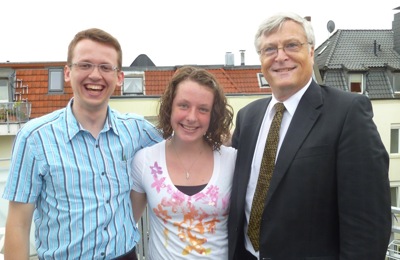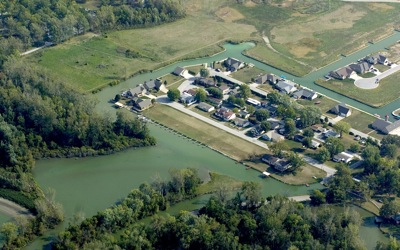Thursday, July 14th, 2011
Auglaize County judge teaches American law in Germany
By Amy Kronenberger

Submitted Photo
Auglaize County Judge Frederick Pepple poses with his daughter, Julia, and former intern Alex Peters in Muenster, Germany. Pepple recently returned from Germany, where he taught American criminal procedure to law students at Muenster University. Peters interned with Pepple in the Auglaize County Common Pleas Court in 2009.
Knowing right from wrong is universal, but how the court system handles criminals varies.
Auglaize County Common Pleas Court Judge Frederick Pepple recently returned from teaching criminal procedure of American law at Muenster University in northwest Germany. The three-week class in June included 21 hours of lecture and a final exam.
"In many ways, German law is a lot different," Pepple said. "For example, everything is in code, or written down rules, instead of common law. However, a lot of their statutes mirror our common law because we helped rebuild their government after the war."
Common law is the practice of developing law through experiences in court cases and the judges' decisions rather than through legislative statutes or executive decisions.
Another difference is Germany has no jury trial. All decisions are made by a judge, a panel of three judges or one judge and two government-chosen people.
"A jury is completely foreign to Germans," Pepple said.
The maximum sentence in Germany for any crime other than murder is 10 years. However, if the criminal is deemed as violent or is perceived as a threat, the judge may hold that person indefinitely, without a specific sentence.
"And of course we'd never allow that in America because of the corruption it could lead to," Pepple said.
To qualify for Pepple's class, the German students must be fluent in English and have completed an internship in a courtroom or law office of a common law country, such as the U.S., Canada, Great Britain, Australia, New Zealand or India.
"They were sitting through a three-hour lecture in English everyday and keeping up," Pepple said. "These are very bright students."
In fact, Pepple, who does not speak German, said he was the one trying to keep up with the students.
"I broke my memory stick, so I had to retype all my lectures," he said. "I was typing like a dog every day to prepare for my class."
Pepple began hosting law interns from Muenster University in his court 11 or 12 years ago. Three years ago the school invited Pepple to teach, which he did in 2008 and 2009. He declined in 2010 because of family health issues. Family members accompanied him on all his trips.
During his recent three-week stay, Pepple had one long weekend to go sightseeing with his family. He traveled into East Germany and visited Dresden and Halle.
Dresden was completely destroyed in World War II and has been rebuilt, Pepple said.
"It was a beautiful city," he said. "I was really impressed with how modern and beautiful it was."
In nearby Leipzig, he visited St. Thomas Lutheran Church, where the composer Johann Bach was choir master and is buried.
In Halle, he was shown around by a former intern who lives in the city and attends University of Halle. Here they visited another Lutheran church where Composer George Handel was a member and learned music. Also at this church were the death mask and casted hands of Martin Luther, the father of the Protestant reformation.
"When I was growing up, I never thought I'd be there (in East Germany)," Pepple said. "I was really impressed."
Five students from Muenster University have contacted Pepple for an internship. Three will work in his court for three weeks this fall and the other two will arrive in February, he said.
Muenster University invited Pepple to return next summer, but he doesn't want to be away from home so long.
"I'm trying to work out a deal with them right now, actually," he said. "If I go back, it'll only be for a week."


